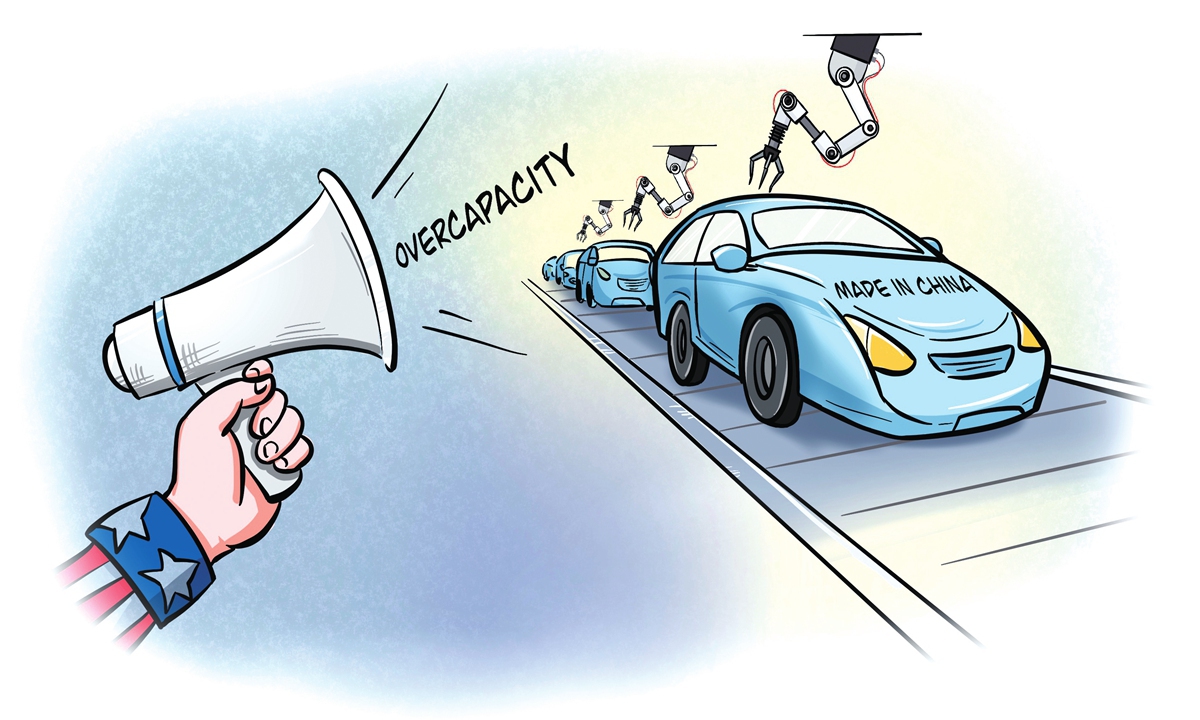
Illustration: Liu Xidan/Global Times
The
G7 Foreign Ministers' communiqué after their meeting in Capri, Italy on Friday highlighted concerns regarding China's "non-market policies and practices," emphasizing that these practices lead to "harmful overcapacity" that undermines workers, industries and economic resilience of G7 countries.
Although the statement affirmed a reluctance to decouple with China, it signals that a collective effort will be made to implement assertive protectionism against Chinese manufacturing.
G7 appears to express concerns about the global economy. However, fundamentally it seeks to hinder and stifle China's industrial growth, aiming for economic dominance to secure a more advantageous competitive position and market edge.
Comprising leading developed nations, the G7 holds a significant position in the current global industrial market. The critique of China's economic policies by the G7 is often seen as a stereotypical display of their irrational and law-resistant stance toward the development of emerging economies.
The G7's criticism reflects a longstanding misunderstanding of China's economic strategy, particularly in terms of its role in the industrialization process. Moreover, it serves as a pretext for the failure of the G7's own economic policies.
China is still in the midst of its industrialization journey, despite undergoing significant transformations toward a service-oriented economic structure. The nation remains in a transitional phase, unlike the G7 countries, which have largely moved beyond industrialization and experienced rapid deindustrialization in recent years.
The assertion that China's policies are antithetical to a market economy is groundless. China has been actively reforming and advancing its industrial policy, doing its best to adapt to the global market, which is evident in the performance of its manufacturing sector in terms of quality, quantity and price. China's industrial policy has proven effective and appropriate for its developmental needs.
The challenge faced by the G7 nations stems from their lack of similar policies and their status as post-industrial economies. As they confront the rise of China, they are beginning to consider adopting similar strategies, especially in areas like infrastructure and high-end manufacturing. However, they have a considerable journey ahead in enhancing their competitive capabilities through significant policy adjustments. If they don't make these changes, they risk losing more of the global market share.
Despite its economic clout, the G7 is not representative of the global economy, nor is it an arbiter of who adheres to or violates the global economic order.
Market dynamics, not the interests of G7 politicians or the geopolitical agendas of developed countries, should drive industrial competitiveness.
We believe that the G7's concerns regarding economic resilience and the labor market essentially revolve around competition. If the products made by G7 nations are of high quality and competitively priced, consumers will naturally prefer them over imports. This preference will drive local companies to improve their competitiveness. Therefore, resorting to trade protectionism to shield domestic industries is viewed as an ineffective approach that ultimately hurts consumers and undermines the competitiveness of local industries.
It is simply impossible for Chinese products to succeed globally if they do not meet the needs and standards of the global market. The global market should decide if Chinese manufacturing is "overcapacity." Quality and market demand should dictate which products are not excessive internationally and do not harm economic resilience, not G7 declarations.
China has significantly contributed to the global shift toward green technologies, focusing on electric vehicles, photovoltaics and batteries, which are crucial for developing nations. It would benefit the global economy if G7 nations matched these contributions by offering more affordable green technologies to less developed countries.
Many American economists and policymakers are concerned about China's growing influence, particularly fearing that other developing nations might emulate China's model as China pushes forward with initiatives like the Belt and Road Initiative. Instead, the real concern should be whether the US and its G7 partners can learn from, not copy, China's industrialization strategies to achieve their own reindustrialization. Therefore, from the perspective of the development of all mankind, China's industrialization is a great progress and drive.
